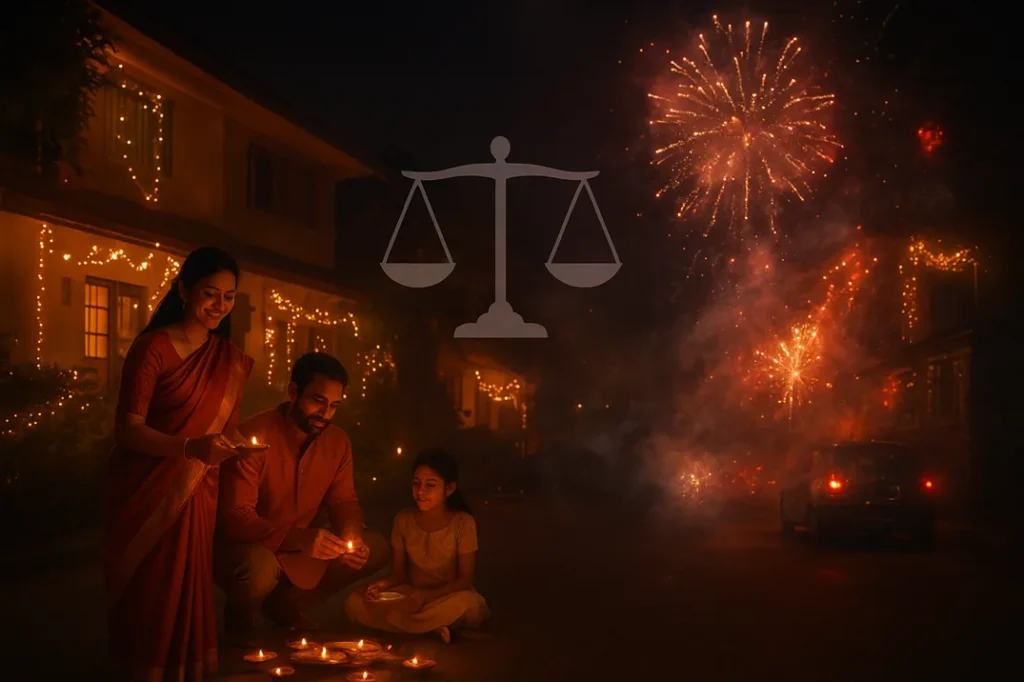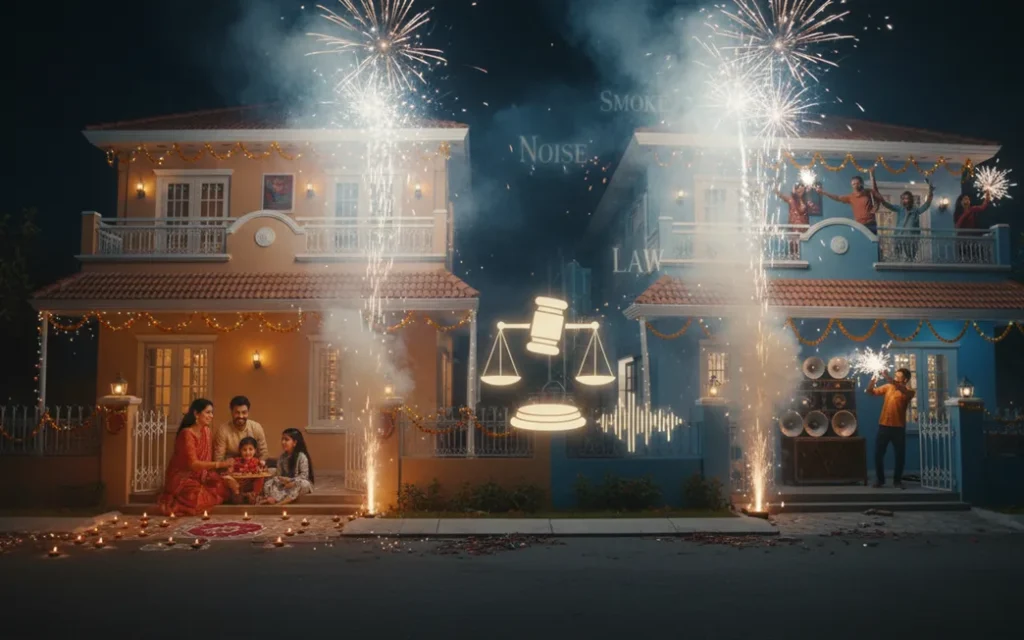Diwali, the festival of lights, is celebrated with immense fervor across India. However, the occasion often sees an unfortunate rise in noise, air, and general public nuisance, especially when festivities cross reasonable limits. The question that many residents face is: legal remedies if neighbour creates public nuisance during Diwali? With increasing awareness around environmental protection and citizens’ rights, it is essential to understand the legal avenues and practical steps available when your neighbour’s celebrations go too far such as excessive firecrackers, loud music, or encroachments that cause common injury or annoyance.

In exploring the legal remedies if neighbour creates public nuisance during Diwali, this blog delivers an authoritative yet practical guide for affected residents, advocates, and community leaders. Drawing from Indian Penal Code, environmental regulations, landmark court judgments, and best legal practices, learn how you can protect your peace, assert your rights, and restore harmony in your neighbourhood.
Table of Contents
Understanding Public and Private Nuisance in Indian Law
Before delving into remedies, it’s crucial to distinguish between public and private nuisance. Legally, public nuisance refers to acts that affect the public at large — causing common injury, danger or annoyance to the community. Private nuisance is interference with the use or enjoyment of one’s property — a civil wrong that may be pursued for compensation or injunction.
During Diwali, when firecrackers create intolerable noise, air pollution, or hazardous conditions, or when music or gatherings extend late into the night, the boundaries between public and private nuisance are often blurred, giving rise to both criminal and civil legal remedies if neighbour creates public nuisance during Diwali.

Legal Remedies if Neighbour Creates Public Nuisance During Diwali
1. Indian Penal Code: Section 268 and Allied Provisions
Section 268 of the IPC defines public nuisance as any act or illegal omission causing common injury, danger, or annoyance to the public or those in the vicinity. Typical acts during Diwali—such as unchecked firecrackers, crowding, or blocking passages—fall squarely under this provision. Related sections (Sections 290 and 291) prescribe fines and penalties for continuing the nuisance despite injunctions.
2. Criminal Procedure Code: Section 133
Section 133 of CrPC empowers Executive Magistrates to order the removal of a public nuisance. Swift action can be sought via this route, particularly when immediate danger to health or safety is posed during Diwali. Magistrates can act on complaints or even suo moto, making this a powerful summary remedy.
3. Noise Pollution (Regulation and Control) Rules, 2000
These rules, framed under the Environment (Protection) Act, stipulate noise limits for firecrackers—125 dB(AI) Leq for individual crackers and 110 dB(AI) Leq for joined series—as well as time restrictions (usually 10 p.m. curfew for loud celebrations).
4. Supreme Court Guidelines and National Green Tribunal Rulings
Courts have repeatedly issued time restrictions for fireworks (often 8–10 p.m.), banned particularly loud or toxic firecrackers, and directed community-only bursting at designated places. These directions are binding and can be enforced through police complaints or civil suits.
5. Civil Law: Tort of Nuisance and Section 91 CPC
In cases where injury is specific to an individual or a group, civil suits for damages or injunctions can be filed based on the law of torts (nuisance), and Section 91 of the CPC empowers even two or more residents to jointly seek remedies for public nuisance.
What Constitutes Public Nuisance During Diwali?
- Bursting of firecrackers beyond permissible decibel and time limits
- Use of hazardous or illegal firecrackers
- Playing loudspeakers or music late at night
- Obstructing roads or passages for festivities
- Dumping waste, blocking drains, or creating health hazards
If any of these acts by your neighbour create public nuisance during Diwali, several legal remedies are accessible.
Step-by-Step Legal Remedies if Neighbour Creates Public Nuisance During Diwali
1. Dialogue and Written Notice
Start with a direct, amicable approach—communicate your grievance and seek voluntary compliance. If informal communication fails, serve a formal written notice to your neighbour mentioning the specific nuisance, rules violated, and consequences of non-compliance. This step may often secure resolution without escalation.
2. Approach the Residents’ Welfare Association (RWA)
If residing in a society, escalate the complaint to the RWA, which has the power to regulate conduct and enforce community rules concerning noise and nuisance. Most RWA by-laws expressly address noise restrictions.
3. Police Complaint
Lodge a complaint at the local police station under Sections 268, 290 IPC and provisions of the Environment Protection Act and Noise Rules. Police may issue warnings first and can take punitive action for repeated or severe violations. Police are also empowered to disperse crowds, seize illegal firecrackers, and ensure compliance with curfew hours.
4. Complaint to Pollution Control Board
For noise or air pollution, approach the State Pollution Control Board or use dedicated helplines or online portals for immediate redressal. Authorities have powers to inspect, fine, and shut down nuisance activities, especially during festivals.
5. Section 133 CrPC Application to Executive Magistrate
File an application for immediate relief from nuisance before the District or Sub-Divisional Magistrate. The Magistrate may summarily pass conditional orders for removal, cessation, or prevention of such nuisance, with the help of local police.
6. Civil Suit for Injunction and Damages
In the event of recurring or pronounced nuisance causing specific injury, a civil suit can be filed against the neighbour for injunction (to stop the act) and/or for damages (compensation). Section 91 CPC enables residents to bring public nuisance suits. In private nuisance cases, claimants can seek monetary damages for loss of peace or injury to property and family health.
7. Use of Alternative Dispute Resolution (ADR) and Mediation
Many neighbour disputes are effectively solved by third-party mediation, with speedy, low-cost settlements preserving community harmony. Courts often encourage mediation before proceeding with litigation.
Enforcement and Real-World Remedies
- Injunctive relief: Immediate court orders to stop nuisance
- Police enforcement: Seizure of firecrackers, dispersal of crowds
- Penalty/fines: Under IPC, Environment Protection Act, and Noise Pollution Rules
- Compensation: For health hazards or property loss caused by proven nuisance
- Community mediation: Settles matters without escalating tensions
Landmark Cases & Precedents
Several judicial pronouncements have affirmed the right to peaceful enjoyment of property and the enforceability of noise pollution limits during festivals. The Supreme Court has repeatedly balanced religious freedom with the right to health and a pollution-free environment. Courts have banned or restricted firecrackers in cities with rising air pollution, directed compliance with ambient air quality and noise standards, and punished violations even during Diwali, underscoring that festivities cannot override fundamental rights to life and health.
Frequently Asked Questions (FAQs)
Q. Can I file a legal case if my neighbour bursts firecrackers late at night during Diwali?
Yes. If the noise exceeds permitted levels or continues beyond 10 p.m., you can file a complaint with the police or seek an order from the Magistrate under Section 133 CrPC.
Q. What if the RWA does not take action?
You can approach the police, the Pollution Control Board, or file for an injunction in court, regardless of the RWA’s response or inaction.
Q. Are there fines for nuisance by firecrackers?
Yes. Offenders may be fined under Section 290 IPC and the Environment (Protection) Act. Repeat or grievous violations attract higher penalties or criminal charges.
Q. Is a legal notice mandatory before approaching authorities?
While not mandatory, serving a legal notice is a good practice, often resolving the matter amicably and establishing your intent for subsequent proceedings if needed.
Q. Can I claim damages for health problems caused by my neighbour’s Diwali nuisance?
Yes. In addition to injunctive relief, courts may grant compensation where specific injury or loss is established due to the nuisance.
Q. Can women, children, or elderly residents complain?
Absolutely. In fact, their grievances receive greater attention, considering the enhanced risk and vulnerability to pollution and noise.
Best Practices for a Peaceful Diwali
- Raise awareness: Discuss the legal consequences of nuisance among neighbours before Diwali.
- Community celebration: Opt for supervised community fireworks at designated places.
- Eco-friendly options: Encourage green crackers and noise-free Diwali.
- Keep records: Save evidence (photos, recordings, notices) in case legal action is required.
- Consult legal experts: For persistent cases, professional assistance can expedite remedies.
Asserting Your Rights While Upholding Harmony
Legal remedies if neighbour creates public nuisance during Diwali are comprehensive, whether through criminal complaints, police and pollution boards, or civil suits for compensation and injunction. Dialogue and mediation are encouraged, but the law stands firmly on the side of those seeking a peaceful and healthy environment.
read about Zero FIR Filed Against Rakesh Kishore for Shoe Hurling Incident at Supreme Court